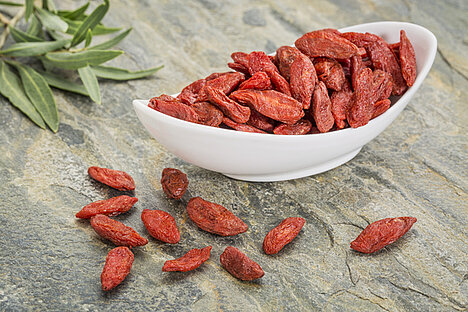Goji berry

What is a goji berry?
The goji berry, also known as wolfberry or buckthorn fruit, is the fruit of a plant from the nightshade family. It grows mainly in China, Tibet and Mongolia, where it has been used as a medicinal plant for thousands of years. The berries are oval and bright red. They taste sweet and sour and can be eaten fresh or dried.
What are the benefits of goji berries for dogs?
Goji berries have a number of positive properties that dogs can also benefit from. Firstly, it contains many important nutrients such as vitamins A, C, E, B1, B2, B6, iron, zinc, copper, selenium and potassium. These can strengthen the immune system, improve eyesight, care for the skin and coat and promote cell health. Goji berries also have a high antioxidant effect, which can protect against free radicals. Free radicals are harmful molecules that are caused by environmental factors or metabolic processes and can lead to inflammation, ageing and disease. Antioxidants can neutralize them and thus reduce the risk of cancer, cardiovascular disease and other chronic diseases.
What are the disadvantages of goji berries for dogs?
Goji berries are not suitable for every dog and should only be fed in moderation. For one thing, goji berries can cause allergic reactions such as itching, skin rashes or gastrointestinal complaints in some dogs. When you give your dog goji berries for the first time, you should therefore observe closely how he reacts to them. Goji berries can also interact with some medications and strengthen or weaken their effect. This applies in particular to blood-thinning or blood sugar-lowering medication. If your dog is taking such medication, you should talk to your vet beforehand about whether you can give them goji berries.
How do I feed my dog goji berries?
If you want to give your dog goji berries, you should pay attention to a few points. Firstly, you should only buy high-quality goji berries that do not contain any additives such as sugar or preservatives. Secondly, you should wash or soak the berries thoroughly before feeding them to remove any harmful substances. The berries should also be chopped or pureed so that the dog can digest them better. The recommended amount of goji berries for dogs is around one teaspoon per 10 kilograms of body weight per day. You can give the berries on their own or mix them into the food.
The goji berry is a healthy fruit that can also have a number of benefits for dogs. It can support the immune system, promote eyesight and protect against free radicals. However, goji berries should only be fed in small quantities and attention should be paid to possible side effects.
If you notice any signs of hypersensitivity or poisoning in your dog, you should see your vet immediately. We are not a substitute for a vet, but we try to be as accurate as possible. Every dog reacts differently and we recommend you get a second opinion or consult your vet if in doubt.
Stay healthy and take good care of your four-legged friend!😊
Similar to Goji berry
Acai berries are around 1 to 1.4 cm in size and have a large core in the middle. They consist of around 20 percent healthy, unsaturated fatty acids and are low in sugar and high in protein and...
Aronia mainly contains secondary plant substances that play an important role in the metabolism and in the defense against pathogens. Particularly noteworthy are the so-called anthocyanins, which...
Cranberries have many positive properties for dogs. They contain a lot of vitamin C, which has an anti-inflammatory effect and strengthens the immune system.They are also rich in antioxidants, which...
Mulberries grow on the tree of the same name and come in a variety of colors - including white, red and black - with each color variety having slightly different flavors and nutritional profiles....



